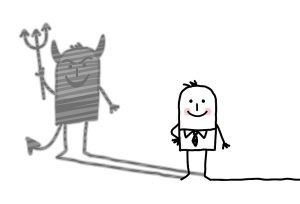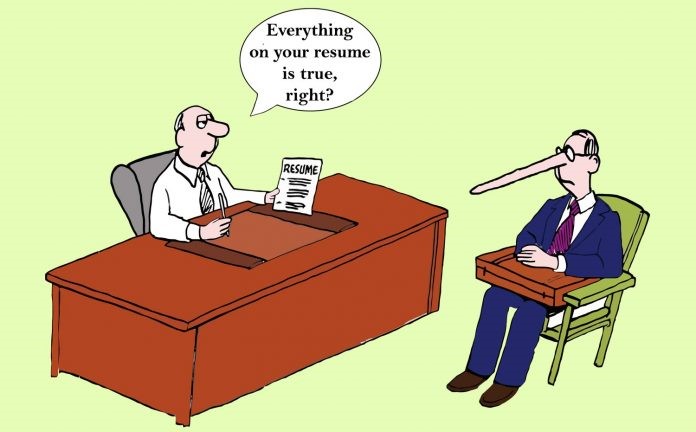Some people tend to present themselves better if they are actually striving for a prospective position. It may lead to hiring the wrong person, wasting time and getting a high turn-over rate. Sometimes it is difficult to uncover the truth because the time of the interview is very limited. If this situation is familiar to you, here are some tips to unveil the fake candidate. So, how to tell when someone is lying?
Vague Responses
The fact that people who tell truth speak differently from those who tend to lie is not new. Scientists came to this conclusion based on data from textual analysis. You can apply this knowledge in practice to make better HR decisions. For example, if you see that a candidate tends to speak in generalities, without giving specific answers or gives you vague responses – be sure: they lie! Undoubtedly, you cannot 100% state that a person who is giving vague responses isn’t telling the truth, but this is the most common linguistical tip denoting a lier.
Describing Past Experiences
Usually, candidates are asked about their experiences and past achievements. High performers are specific and eagerly share detailed stories as they don’t have any reason to lie. For example, you may ask them about their experience of working in a team. They are supposed to answer with full details: how they were involved in brainstorming sessions, discussed interim results of a project, shared ideas of how to do the job better, what they felt while working in a team, what were the relationships in a team, etc. Truth-tellers describe a real-life story using first-person pronouns as they indeed had these experiences. People who want to conceal the truth are not willing to describe any specific details related to their teamwork experiences. A made-up story lacks details and doesn’t sound realistic. Such a story can be unrealistically straightforward and vague. People hiding the truth tend to use second or third person pronouns that psychologically keep them out of their own lie. Typically, their responses sound like “we had a really great team”, “I met really smart people there”, “we had a lot of great ideas”, “we met all the time”, etc. Non-specific answers of your candidate, using hypothetical language (“could do”) or qualifiers (“really smart”, “really great”, “always discussing”) indicate a lier.
Body Language
Sometimes job candidates lie to win a good position if they don’t have necessary skills or experiences. You can identify whether a person tells truth or lies by scanning their body language. There are a lot of books and blog posts available on the internet describing body language patterns. For example, if a candidate avoids eye contact or fidgets, probably, they are not honest. However, it is natural to be nervous during an interview. Therefore, this can be an unreliable cue to identify a lier. Here we list several cues which may indicate deception:
- Crossing arms (a candidate doesn’t want to disclose information, isn’t willing to maintain contact or stifled);
- Leaning away on a chair (a candidate implicitly wants to distract himself from a conversation for some reason);
- Touching hands (candidates instinctively try to calm themselves down when they are nervous);
- Touching face (this is an instinctive behavior of someone who is not telling truth).
You may wish to conduct a lie detector interview to reveal whether your job candidate lies or not. But how much is a lie detector test? This is an expensive pattern to detect lying in an interview: the cost of lie detector testing varies from $200 to $2000 for a two-hour single-issue exam. Besides, some people can control their emotions very well.
Non-Verbal Cues
Non-verbal cues can tell that your candidate is lying if:
- His facts are contradicting;
- His answers are overly scripted;
- His answers are excessively chronological.
These behaviors often correlate with lying. However, sometimes it is really difficult to identify whether a candidate is lying. Good news: you don’t need to spend a lot of time trying to identify this because time is precious. What you need to do is to predict whether a candidate could be a high performer at a new position. Therefore, try to ask more questions related to their knowledge, abilities, and skills. It’s also important to reveal whether they meet the requirements for this position. Sometimes interviewees fail because an interviewer cannot ask proper questions, but not because they are lying. For example, you need to interview your candidate by asking the related questions when you hold a resume for teacher job application. You need to prepare interview questions and materials in advance to be able to ask job-specific questions and reveal the level of qualification of your candidate.
Test Candidate’s Skills
If you have any doubts that your candidate is lying, you may try to test their skills. It is easy to buy essay online and have a perfect cover letter, but when it comes to direct communication, you can use a “competency-based interview” to find out whether your candidate possesses the skills they claimed to have. You need to ask what a potential employee did and how they did something and then watch if they quickly reply to the questions or not. If the candidate is mumbling or making pauses when sharing their experiences, most probably, they are not confident in their response that may indicate low expertise or attempts to demonstrate experiences or skills they don’t possess.
Check References
All is fair in war. An interview is a process when you have to discover as much information as possible at a limited timeframe. Therefore, you may ask for references to confirm your candidate has necessary skills of experiences. This is a normal practice in the job application process. Ask if your candidate can provide you with referencing – this will help them be more honest. You will need to carefully check the dates of employment, companies a candidate worked for and tasks completed. This will help to collect as much information as possible to make appropriate conclusions regarding the personality of your candidate and compare the facts.
Check Candidate Social Media Profiles
Social media profiles can be an additional source of information about your candidate. Sometimes the style of life, habits, and photos can tell more than thousands of words. This information is free of charge and it allows you observing your candidate in an informal setting. It may help to understand better if a person is prone to lie or not. For example, LinkedIn or UpWork is an excellent starting point to check the online profile of your candidate and compare it to their CV. You can refer to their profile during the interview and ask for their comments if any inconsistencies were found.
Rely on Experience and Intuition
If you are an experienced interviewer, you can understand when a person is lying without any difficulties. Probably, you need more communication and practice to be able to reveal liers. Sometimes it is worth to be attentive and listen to your inner voice. However, you need to be cautious not to excessively rely on your intuition. As a rule, facts are better arguments because interviewers need to be objective.





